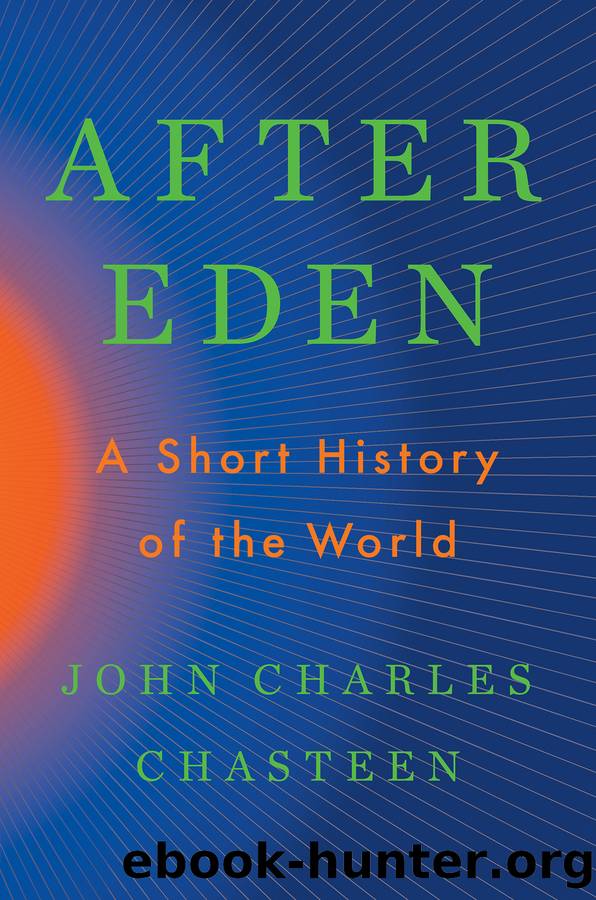After Eden: A Short History of the World by John Charles Chasteen

Author:John Charles Chasteen [Chasteen, John Charles]
Language: eng
Format: epub
Tags: Non-Fiction, History, Science, Political Science
ISBN: 9781324036937
Publisher: W. W. Norton & Company
Published: 2023-11-13T13:00:00+00:00
The European Breakout
Little Portugal was able to outflank the Ottoman presence and directly access the Spice Route. Then Spain destroyed the Aztec and Inca Empires. Thatâs the skinnyâthe same basic stuff children learn about in primary school, expressed here without the habitual mythmaking. Instead of cheerleading, weâll try to understand the hows and whys of the process.
Portugal was precocious among European kingdoms in the 1400s. The Portuguese monarchy had gained social heft from its centuries-long crusade against the Moors. Its leading role in the reconquest of Iberia helps explain why little Portugal was first to circumnavigate Africa. After expelling Moors (and Jews) who refused conversion to Christianity in 1496, the crusading energies of the Portuguese crown pursued the defeated Muslims back to North Africa. The Portuguese king Sebastian died there, personally leading a charge into Muslim lines. Sebastianâs body was never recovered, and desperate rumors of his miraculous survival circulated for years in Portugal.
The Ottoman Empire stood at its high point, and the Portuguese regarded themselves as the advance guard of Christendom. These details shed light on Portuguese promotion of a long-term exploration project intended, in part, to join forces with a mythical Christian monarch whose kingdom supposedly lay in sub-Saharan Africa.
This project, Portugalâs exploration of the Atlantic coast of Africa in the later 1400s, was begun by the man known to history as Henry the Navigator. A Portuguese prince who never became king, this ânavigatorâ was not a sailor. Henry was a royal booster who foregrounded the idea of religious mission, but he had more on his mind. Africa seemed to him a promising field for Portuguese enrichment. The small but steady flow of gold brought from south of the Sahara by the caravan trade had not escaped his attention. He devoted his life to collecting information, drawing maps, and funding expeditions. The project was to sail south, down the Atlantic coast of Africa, to see what was there. Presumably, Africa had a southern tip that could be rounded, allowing one to sail from the Atlantic into the Indian Oceanâbut nobody knew for sure. The problem wasnât getting the hunch or daring to try, however. Prevailing headwinds (blowing north) made sailing south along the coast practically impossible. As a result, the Portuguese began to rig their ships with the triangular sails used by Arab dhows, which enabled better progress against a headwind, but it was still slow going. One Portuguese expedition after another turned back in frustration.
When Henry died, the Portuguese crown sold this project to a consortium of Lisbon investors who made it more profitable. Having eventually progressed south of the Sahara, Portuguese explorers had begun to finance themselves by stopping along the African coast to procure gold dust and black slaves. Outright chattel slavery, the buying and selling of people, had disappeared from Europe after Roman times. Therefore, black African slaves were now marketed in Portugal and Spain as exotic novelty items for the aristocracy. The profits of slaving led the Portuguese crown to reassume control of
Download
This site does not store any files on its server. We only index and link to content provided by other sites. Please contact the content providers to delete copyright contents if any and email us, we'll remove relevant links or contents immediately.
| Arms Control | Diplomacy |
| Security | Trades & Tariffs |
| Treaties | African |
| Asian | Australian & Oceanian |
| Canadian | Caribbean & Latin American |
| European | Middle Eastern |
| Russian & Former Soviet Union |
The Secret History by Donna Tartt(19090)
The Social Justice Warrior Handbook by Lisa De Pasquale(12190)
Thirteen Reasons Why by Jay Asher(8912)
This Is How You Lose Her by Junot Diaz(6887)
Weapons of Math Destruction by Cathy O'Neil(6281)
Zero to One by Peter Thiel(5802)
Beartown by Fredrik Backman(5755)
The Myth of the Strong Leader by Archie Brown(5508)
The Fire Next Time by James Baldwin(5446)
How Democracies Die by Steven Levitsky & Daniel Ziblatt(5219)
Promise Me, Dad by Joe Biden(5154)
Stone's Rules by Roger Stone(5088)
A Higher Loyalty: Truth, Lies, and Leadership by James Comey(4964)
100 Deadly Skills by Clint Emerson(4926)
Rise and Kill First by Ronen Bergman(4789)
Secrecy World by Jake Bernstein(4753)
The David Icke Guide to the Global Conspiracy (and how to end it) by David Icke(4720)
The Farm by Tom Rob Smith(4514)
The Doomsday Machine by Daniel Ellsberg(4490)
